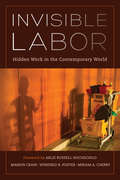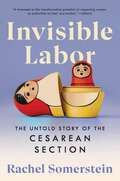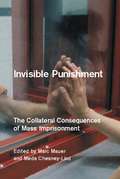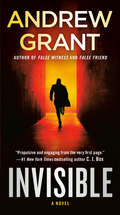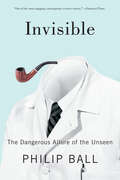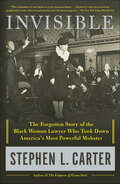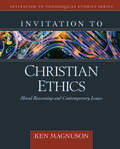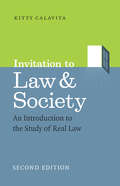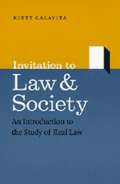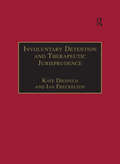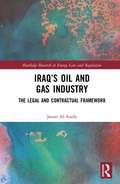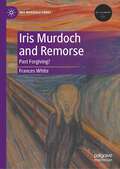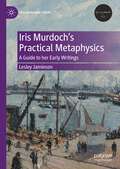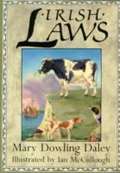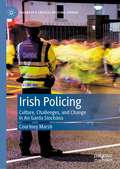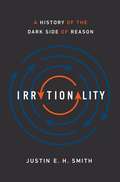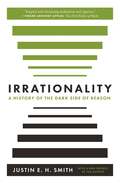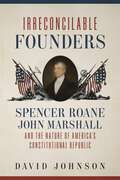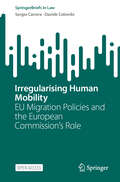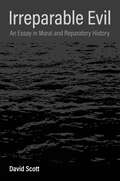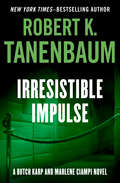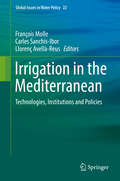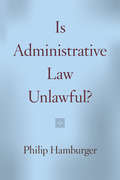- Table View
- List View
Invisible Labor: Hidden Work in the Contemporary World
by Marion Crain Miriam Cherry Winifred PosterAcross the world, workers labor without pay for the benefit of profitable businesses--and it's legal. Labor trends like outsourcing and technology hide some workers, and branding and employer mandates erase others. Invisible workers who remain under-protected by wage laws include retail workers who function as walking billboards and take payment in clothing discounts or prestige; waitstaff at "breastaurants" who conform their bodies to a business model; and inventory stockers at grocery stores who go hungry to complete their shifts. Invisible Labor gathers essays by prominent sociologists and legal scholars to illuminate how and why such labor has been hidden from view.
Invisible Labor: The Untold Story of the Cesarean Section
by Rachel SomersteinAn incisive yet personal look at the science and history of the most common surgery performed in America—the cesarean section—and an exposé on the disturbing state of maternal medical careWhen Rachel Somerstein had an unplanned C-section with her first child, the experience was anything but “routine.” A series of errors by her clinicians led to a real-life nightmare: surgery without anesthesia. The ensuing mental and physical complications left her traumatized and searching for answers about how things could have gone so wrong.In the United States, one in three babies is born via C-section, a rate that has grown exponentially over the past fifty years. And while in most cases the procedure is safe, it is not without significant, sometimes life-changing consequences, many of which affect people of color disproportionately. With C-sections all but invisible in popular culture and pregnancy guides, new mothers are often left to navigate these obstacles on their own.Somerstein weaves personal narrative and investigative journalism with medical, social, and cultural history to reveal the operation’s surprising evolution, from its early practice on enslaved women to its excessive promotion by modern medical practitioners. She uncovers the current-day failures of the medical system, showing how pregnant women's agency is regularly disregarded by providers who, motivated by fear of litigation or a hospital’s commitment to efficiency, make far-reaching and deeply personal decisions on behalf of their patients. She also examines what prevailing maternal and medical attitudes toward C-sections tell us about American culture.Invisible Labor lifts the veil on C-sections so that people can make choices about pregnancy and surgical birth with greater knowledge of the risks, benefits, and alternatives, with information on topics including:VBAC (vaginal birth after cesarean) and repeat c-sectionPain and pain management during childbirthHow C-sections can affect family planningThe valuable role of midwives and doulas in the birth experienceThe myths behind “natural” childbirth How limitations put on reproductive rights impact pregnant peopleWith deep feeling and authority, Somerstein offers support to others who have had difficult or traumatic birth experiences, as well as hope for new forms of reproductive justice.
Invisible Punishment
by Marc Mauer Meda Chesney-LindIn a series of newly commissioned essays from the leading scholars and advocates in criminal justice, Invisible Punishment explores, for the first time, the far-reaching consequences of our current criminal justice policies. Adopted as part of "get tough on crime" attitudes that prevailed in the 1980s and '90s, a range of strategies, from "three strikes" and "a war on drugs," to mandatory sentencing and prison privatization, have resulted in the mass incarceration of American citizens, and have had enormous effects not just on wrong-doers, but on their families and the communities they come from. This book looks at the consequences of these policies twenty years later.
Invisible: A Novel (Paul McGrath #1)
by Andrew GrantAn Army veteran and intelligence agent goes undercover as a janitor at a federal courthouse to pursue his own brand of justice in a thriller that’s part John Grisham, part Robert Crais.“Propulsive and engaging from the very first page.”—C. J. Box, #1 New York Times bestselling author of the Joe Pickett series As a young man, Paul McGrath rebelled against his pacifist father by becoming a standout Army recruit and the star of his military intelligence unit. But lingering regrets about their relationship make him return home, only to find his father dead, seemingly murdered. When the case ends in a mistrial—after a key piece of evidence disappears—something doesn’t smell right to McGrath. So he puts his arsenal of skills to work to find out just how corrupt the legal system is. And to keep digging, he gets a job at the courthouse. But not as a lawyer or a clerk. . . . Now McGrath is a janitor. The perfect cover, it gives him security clearance and access to the entire building. No one notices him, but he notices everyone. He notices when witnesses suddenly change their stories. When jury members reverse their votes during deliberation. When armies of corporate attorneys grind down their small-time adversaries with endless tactical shenanigans. While McGrath knows that nothing he discovers can undo his past wrongs or save his father, he finds his new calling brings him something else: the chance to right current wrongs and save others. And by doing so—just maybe—to redeem himself . . . if the powerful and corrupt don’t kill him first.Advance praise for Invisible “The masterful Andrew Grant outdoes himself with this deliciously twisty, magnetic thriller. Fiercely redemptive, with its clever, profoundly moving, and altogether captivating David and Goliath hook, Invisible is a winner.”—Sara Blaedel, #1 internationally bestselling author of The Forgotten Girls“Paul McGrath is not just a janitor—he’s a terrific new hero in what promises to be a fantastic and original series by Grant. Paul may be invisible . . . but his results are not in this intense mystery thriller that will leave you wanting more. In a word? Awesome.”—Allison Brennan, New York Times bestselling author of Too Far Gone“Invisible is a riveting read from cover to cover. I love getting in on the ground floor of a new series, especially when it’s sure to be a hit!”—John Gilstrap, New York Times bestselling author of the Jonathan Grave series
Invisible: The Dangerous Allure of the Unseen
by Philip Ball“A very fun, largely chronological journey through invisibility, beginning with myth and early magicians, ending with quantum physics.” —The New YorkerIn this lively look at a timeless idea, Ball provides the first comprehensive history of our fascination with the unseen. This sweeping narrative moves from medieval spell books to the latest nanotechnology, from fairy tales to telecommunications, from camouflage to ghosts to the dawn of nuclear physics and the discovery of dark energy. Along the way, Invisible tells little-known stories about medieval priests who blamed their misdeeds on spirits; the Cock Lane ghost, which intrigued both Samuel Johnson and Charles Dickens; the attempts by Victorian scientist William Crookes to detect forces using tiny windmills; novelist Edward Bulwer-Lytton’s belief that he was unseen when in his dressing gown; and military efforts to enlist magicians to hide tanks and ships during WWII. Bringing in such voices as Plato and Shakespeare, Ball provides not only a scientific history but a cultural one—showing how our simultaneous desire for and suspicion of the invisible has fueled invention and the imagination for centuries.In this unusual and clever book, Ball shows that our fantasies about being unseen—and seeing the unseen—reveal surprising truths about who we are.“Full of insights drawn from a broad survey of history, literature and philosophy; wherever the invisible is being contemplated, Ball is there to select the juiciest anecdotes . . . [He] is a lucid, witty and highly entertaining guide.” —The Globe and Mail“A tour-de-force history capped off with an animated discussion of H.G. Wells’s novel The Invisible Man.” —Publishers Weekly (starred review)
Invisible: The Forgotten Story of the Black Woman Lawyer Who Took Down America's Most Powerful Mobster
by Stephen L. CarterThe bestselling author delves into his past and discovers the inspiring story of his grandmother’s extraordinary life She was black and a woman and a prosecutor, a graduate of Smith College and the granddaughter of slaves, as dazzlingly unlikely a combination as one could imagine in New York of the 1930s—and without the strategy she devised, Lucky Luciano, the most powerful Mafia boss in history, would never have been convicted. When special prosecutor Thomas E. Dewey selected twenty lawyers to help him clean up the city’s underworld, she was the only member of his team who was not a white male.Eunice Hunton Carter, Stephen Carter’s grandmother, was raised in a world of stultifying expectations about race and gender, yet by the 1940s, her professional and political successes had made her one of the most famous black women in America. But her triumphs were shadowed by prejudice and tragedy. Greatly complicating her rise was her difficult relationship with her younger brother, Alphaeus, an avowed Communist who—together with his friend Dashiell Hammett—would go to prison during the McCarthy era. Yet she remained unbowed.Moving, haunting, and as fast-paced as a novel, Invisible tells the true story of a woman who often found her path blocked by the social and political expectations of her time. But Eunice Carter never accepted defeat, and thanks to her grandson’s remarkable book, her long forgotten story is once again visible.
Invitation to Christian Ethics: Moral Reasoning And Contemporary Issues (Invitation to Theological Studies)
by Ken MagnusonA comprehensive introduction to Christian ethics addressing today’s most challenging moral issuesInvitation to Christian Ethics is an indispensable guide for helping pastors, counselors, and everyday Christians navigate today’s difficult moral questions. Readers will benefit from Ken Magnuson’s survey of ethics from a biblical perspective as well as contemporary theories of moral reasoning. This survey is followed by twelve chapters devoted to some of the thorniest issues Christians encounter today, such as: • Sexuality, including homosexuality, sexual identity, and gender• Marriage and divorce• Infertility and assisted reproductive technologies• Abortion• Physician-assisted suicide• Race relations• Creation care• Capital punishment• Just war, pacifism, and the use of lethal forceMagnuson provides biblical insight into each topic and presents key moral considerations. He also answers specific, practical questions that arise and concludes with a summary of his recommended approach to each issue. Readers will learn how to grapple with difficult moral questions and will receive guidance for some of life’s most challenging ethical conundrums.
Invitation to Law and Society, Second Edition: An Introduction to the Study of Real Law (Chicago Series in Law and Society)
by Kitty CalavitaLaw and society is a rapidly growing field that turns the conventional view of law as mythical abstraction on its head. Kitty Calavita brilliantly brings to life the ways in which law is found not only in statutes and courtrooms but in our institutions and interactions, while inviting readers into conversations that introduce the field's dominant themes and most lively disagreements. Deftly interweaving scholarship with familiar examples, Calavita shows how scholars in the discipline are collectively engaged in a subversive exposé of law's public mythology. While surveying prominent issues and distinctive approaches to both law as it is written and actual legal practices, as well as the law's potential as a tool for social change, this volume provides a view of law that is more real but just as compelling as its mythic counterpart. With this second edition of Invitation to Law and Society, Calavita brings up to date what is arguably the leading introduction to this exciting, evolving field of inquiry and adds a new chapter on the growing law and cultural studies movement.
Invitation to Law and Society: An Introduction to the Study of Real Law
by Kitty CalavitaLaw and Society is a rapidly-growing interdisciplinary field that turns on its head the conventional, idealized view of the "Law" as a magisterial abstraction. Kitty Calavita's Invitation to Law and Society brilliantly brings to life the ways in which law shapes and manifests itself in the institutions and interactions of human society, while inviting the reader into conversations that introduce the field's dominant themes and most lively disagreements.Deftly interweaving scholarship with familiar personal examples, Calavita shows how scholars in the discipline are collectively engaged in a subversive exposé of law's public mythology. While surveying prominent issues and distinctive approaches to the use of the law in everyday life, as well as its potential as a tool for social change, this volume provides a view of law that is more real but just as compelling as its mythic counterpart. In a field of inquiry that has long lacked a sophisticated yet accessible introduction to its ways of thinking,Invitation to Law and Society will serve as an engaging and indispensable guide.
Involuntary Detention and Therapeutic Jurisprudence: International Perspectives on Civil Commitment
by Kate DiesfeldInternational developments within the last twenty years have demonstrated controversial shifts in treatment for people with mental illnesses and the care of persons with intellectual disabilities. These shifts have been apparent in an emphasis on deinstitutionalization, increased scrutiny of detention and discharge decisions and, in some countries, in enforced treatment and care in the community. As we become increasingly conscious of the political and moral dimensions of civil commitment, these concerns are reflected in the professional literature, but this does not often enough focus on issues of clinical and legal principle, nor is it in a form which encourages comparative analysis. This collection draws on contributors from the UK, the USA, Australia, the Netherlands, Canada and New Zealand, who share a commitment to evaluating whether the civil detention processes protect the liberty, dignity and justice interests of those with mental illnesses and intellectual disabilities. The book is written from a therapeutic jurisprudence perspective and poses a number of questions with international application, such as: Are more categories of people being detained? Is involuntary detention serving new purposes? Are different forms of detention gaining credence and being more widely utilized? And, are admission decisions and review of detention decisions transparent, consistent, and just?
Iowa Driver's Manual
by Iowa Department of TransportationThis manual will provide you the information needed for a general understanding of the principles of safe and lawful operation of a motor vehicle. However, it is NOT intended to serve as a precise statement of Iowa statutes concerning the operation of a motor vehicle and should not be considered as such.
Iran Awakening: One Woman's Journey to Reclaim Her Life and Country
by Azadeh Moaveni Shirin EbadiThe moving, inspiring memoir of one of the great women of our times, Shirin Ebadi, winner of the 2003 Nobel Peace Prize and advocate for the oppressed, whose spirit has remained strong in the face of political persecution and despite the challenges she has faced raising a family while pursuing her work. Best known in this country as the lawyer working tirelessly on behalf of Canadian photojournalist, Zara Kazemi -- raped, tortured and murdered in Iran -- Dr. Ebadi offers us a vivid picture of the struggles of one woman against the system. The book movingly chronicles her childhood in a loving, untraditional family, her upbringing before the Revolution in 1979 that toppled the Shah, her marriage and her religious faith, as well as her life as a mother and lawyer battling an oppressive regime in the courts while bringing up her girls at home. Outspoken, controversial, Shirin Ebadi is one of the most fascinating women today. She rose quickly to become the first female judge in the country; but when the religious authorities declared women unfit to serve as judges she was demoted to clerk in the courtroom she had once presided over. She eventually fought her way back as a human rights lawyer, defending women and children in politically charged cases that most lawyers were afraid to represent. She has been arrested and been the target of assassination, but through it all has spoken out with quiet bravery on behalf of the victims of injustice and discrimination and become a powerful voice for change, almost universally embraced as a hero. Her memoir is a gripping story -- a must-read for anyone interested in Zara Kazemi's case, in the life of a remarkable woman, or in understanding the political and religious upheaval in our world.
Iraq’s Oil and Gas Industry: The Legal and Contractual Framework (Routledge Research in Energy Law and Regulation)
by Janan Al-AsadyOil, an integral part of the contemporary global economy, is considered a driving force behind the 2003 invasion of Iraq. Hydrocarbon reserves in Iraq have a significant role to play in global supply, with oil revenue accounting for more than 90% of Iraqi government income. This book provides a comprehensive insight into the key foundations of Iraq’s oil industry and assists in the development of a core area of domestic law to promote economic recovery following years of instability. It addresses the development of oil legislation and the formation of contracts since the US and allied occupation of Iraq in 2003. Legislation is assessed against the framework of the constitution along with the different types of oil agreements and their terms. The book looks at three main aspects of oil legislation, beginning with the validity and interpretation of the constitution as any subsequent legislation governing oil policy will be based upon this. The work then discusses whether the draft oil and gas law of 2007 and any subsequent oil legislation, including the law implemented by the Kurdish Regional Government in 2007, is valid. Finally, the book analyses the legitimacy of oil agreements entered into by the central and regional governments and whether these contain terms beneficial to the state and contracting party. Providing an in-depth analysis of the origins and development of the legal framework of the oil industry in Iraq, the book acts as both a reference source and a springboard for future research across a range of legal, economic and policy perspectives. It will appeal to practitioners and academics working in energy law and international investment law, as well as policy-makers, legal advisors and those working in governments and energy companies.
Iris Murdoch and Remorse: Past Forgiving? (Iris Murdoch Today)
by Frances WhiteThis exploration of the crucially important role played by remorse in Iris Murdoch’s philosophical, theological, and political thinking identifies it as a critical concept in her moral psychology and a recurrent theme in her art. Through engagement with Simone Weil, current theories of remorse, trauma theory and Holocaust studies, it offers fresh perspectives on Murdoch’s fiction – particularly the late novels, her radio play The One Alone, and her monograph Heidegger.
Iris Murdoch’s Practical Metaphysics: A Guide to her Early Writings (Iris Murdoch Today)
by Lesley JamiesonThis book explores Iris Murdoch as a philosopher who, through her distinctive methodology, exploits the advantages of having a mind on the borders of literature and politics in her early career writings (pre-The Sovereignty of Good). By focusing on a single decade of Murdoch’s early career, Jamieson tracks connections between her views on the state of literature and politics in postwar Britain and her approach to the philosophy of mind and moral philosophy. Furthermore, this close study reveals that, far from a stylistic quirk, Murdoch’s use of metaphors, analogies, and other literary devices is internal to her methodology. Finally, rather than asking what Murdoch’s views are, this work will ask “what is Murdoch trying to achieve with her writings and public lectures, and how does she go about this?” By answering the latter question, we will have a new strategy for interpreting her writings more generally. The book contributes to the growing body of scholarship focusing on Iris Murdoch’s philosophical writings, and on women in the history of analytic philosophy.
Irish Laws
by Mary Dowling Daley[from the back cover] "It is illegal to leave a cow exposed to wild dogs and pirates. While the ancient Irish poets sang the praises of oak, elm, or spreckled salmon, the Brehons, or lawyer-arbitrators, were scratching down the ancient Irish laws. Although eminently practical, they often seem as whimsical as the Irish themselves are purported to be. Today the laws are appealing as much for their fair-mindedness as for their offbeat humor and naive charm."
Irish Policing: Culture, Challenges, and Change in An Garda Síochána (Palgrave's Critical Policing Studies)
by Courtney MarshThis book examines the organisational culture of the Irish police service, speaking in particular to those interested in policing organisations and organisational culture. It is set against a backdrop of considerations such as community policing, police accountability, the management of change in Irish policing, and where the Irish police situates itself in relation to police organisations internationally. An Garda Síochána, the national police service of the Republic of Ireland, has a stated community policing style which focuses on an interactive relationship with the community and results in a largely unarmed policing organisation which makes it different to most police organisations. Yet, the author argues that the organisational culture has prevented them from embodying community policing across the organisation. Exploring the organisation’s historical context and how they are trained, this book draws on new research and data spanning 30 years including tribunals and reports to examine the organisational culture over time including potential misconduct, blame culture, and resistance to change within the organisation, in order to provide a more thorough understanding of a relatively unknown policing organisation.
Irrationality: A History of the Dark Side of Reason
by Justin E. SmithA fascinating history that reveals the ways in which the pursuit of rationality often leads to an explosion of irrationalityIt’s a story we can’t stop telling ourselves. Once, humans were benighted by superstition and irrationality, but then the Greeks invented reason. Later, the Enlightenment enshrined rationality as the supreme value. Discovering that reason is the defining feature of our species, we named ourselves the “rational animal.” But is this flattering story itself rational? In this sweeping account of irrationality from antiquity to today—from the fifth-century BC murder of Hippasus for revealing the existence of irrational numbers to the rise of Twitter mobs and the election of Donald Trump—Justin Smith says the evidence suggests the opposite. From sex and music to religion and war, irrationality makes up the greater part of human life and history.Rich and ambitious, Irrationality ranges across philosophy, politics, and current events. Challenging conventional thinking about logic, natural reason, dreams, art and science, pseudoscience, the Enlightenment, the internet, jokes and lies, and death, the book shows how history reveals that any triumph of reason is temporary and reversible, and that rational schemes, notably including many from Silicon Valley, often result in their polar opposite. The problem is that the rational gives birth to the irrational and vice versa in an endless cycle, and any effort to permanently set things in order sooner or later ends in an explosion of unreason. Because of this, it is irrational to try to eliminate irrationality. For better or worse, it is an ineradicable feature of life.Illuminating unreason at a moment when the world appears to have gone mad again, Irrationality is fascinating, provocative, and timely.
Irrationality: A History of the Dark Side of Reason
by Justin E. SmithFrom sex and music to religion and politics, a history of irrationality and the ways in which it has always been with us—and always will beIn this sweeping account of irrationality from antiquity to the rise of Twitter mobs and the election of Donald Trump, Justin Smith argues that irrationality makes up the greater part of human life and history. Ranging across philosophy, politics, and current events, he shows that, throughout history, every triumph of reason has been temporary and reversible, and that rational schemes often result in their polar opposite. Illuminating unreason at a moment when the world appears to have gone mad again, Irrationality is timely, provocative, and fascinating.
Irreconcilable Founders: Spencer Roane, John Marshall, and the Nature of America’s Constitutional Republic
by David JohnsonVirginians dominate the early history of the United States, with Washington, Jefferson, Madison, Monroe, Patrick Henry, George Mason, George Wythe, and John Marshall figuring prominently in that narrative. Fellow Virginian Spencer Roane (1762–1822), an influential jurist and political thinker, was in many ways their equal. Roane is nonetheless mostly absent in accounts of early America. The lack of interest in Roane is remarkable since he was the philosophical leader of the Jeffersonians, architect of states’ rights doctrine, a legislator, essayist, and, for twenty-seven years, justice of the Virginia Supreme Court. He was the son-in-law of Henry, a confidant of Jefferson, founder of the influential Richmond Enquirer, and head of the “Richmond Junto.” Roane’s opinions established judicial review of legislative acts ten years before Supreme Court Chief Justice Marshall did the same in Marbury v. Madison. Roane also brought down Virginia’s state-sponsored church. His descent into historical twilight is even more curious given his fierce criticism—both from the bench and in the Richmond Enquirer—of Marshall’s nationalistic decisions. Indeed, the debate between these two judges is perhaps the most comprehensive discussion of federalism outside of the arguments that raged over the ratification of the United States Constitution. In Irreconcilable Founders, David Johnson uses Roane’s long-lasting conflict with Marshall as ballast for the first-ever biography of this highly influential but largely forgotten justice and political theorist. Because Roane’s legal opinions gave way to those of Marshall, historians have tended to either dismiss him or cast him as little more than an annoying gadfly. Equally to blame for his obscurity is the comparative inaccessibility of Roane’s life: no single archive houses his papers, no scholars have systematically reviewed his legal opinions, and no one has methodically examined his essays. Bringing these and other disparate sources together for the first time, Johnson precisely limns Roane’s career, personality, and philosophy. He also synthesizes the judge’s wide-ranging jurisprudence and analyzes his predictions about the dangers of unchecked federal power and an activist Supreme Court. Although contemporary jurists and politicians disregarded Roane’s opinions, many in today’s political and legal arenas are unknowingly echoing his views with increasing frequency, making this reappraisal of his life and reassessment of his opinions timely and relevant.
Irregularising Human Mobility: EU Migration Policies and the European Commission’s Role (SpringerBriefs in Law)
by Sergio Carrera Davide ColombiThis is an open access book. What is the history and current state of play of EU law and policy covering irregularised human mobility? What has been the role and contributions of the 2019-2024 European Commission as regards EU migration policy? This book investigates how migration policies have been problematised at the EU institutional level, in particular by the European Commission. It critically assesses the assumptions lying behind the Commission’s political priorities, agendas and policy outputs. Through the concept of irregularity assemblages, the book examines how EU policy professionals and bureaucracies in the relevant Commission services problematise their respective mandates/portfolios; how they interact with each other and even compete; and how they frame certain forms of human mobility as being an ‘irregular migration problem’ or not. After retracing key historical developments in the framing of irregularised human mobilities at the EU level, the book identifies six policy approaches in the work and structures of the 2019-2024 European Commission. It finds that a home affairs and criminalisation approach that prioritises a law enforcement understanding of cross-border and intra-EU mobility, and pursuing a Ministry of Interior-like agenda, has prevailed. This approach stands at odds with human dignity and other legitimate public policy approaches, such as those giving priority to employment and social inclusion, non-discrimination, and fundamental rights, where the administrative migration status of the individual is not the entry point. The overriding priority driving EU migration policy has been the expulsion, policing and criminalisation of people framed or categorised as ‘irregular migrants’. The analysis shows how Commission has failed to effectively perform its role as guardian of the Treaties and unequivocally enforce and comply with EU Treaty constitutive values, EU law and Better Regulation commitments in migration policies.
Irreparable Evil: An Essay in Moral and Reparatory History
by David ScottWhat was distinctive about the evil of the transatlantic slave trade and New World slavery? In what ways can the present seek to rectify such historical wrongs, even while recognizing that they lie beyond repair? Irreparable Evil explores the legacy of slavery and its moral and political implications, offering a nuanced intervention into debates over reparations.David Scott reconsiders the story of New World slavery in a series of interconnected essays that focus on Jamaica and the Anglophone Caribbean. Slavery, he emphasizes, involved not only scarcely imaginable brutality on a mass scale but also the irreversible devastation of the ways of life and cultural worlds from which enslaved people were uprooted. Colonial extraction shaped modern capitalism; plantation slavery enriched colonial metropoles and simultaneously impoverished their peripheries. To account for this atrocity, Scott examines moral and reparatory modes of history and criticism, probing different conceptions of evil. He reflects on the paradoxes of seeking redress for the specific moral evil of slavery, criticizing the limitations of liberal rights-based arguments for reparations that pursue reconciliation with the past. Instead, this book argues, in making the urgent demand for reparations, we must acknowledge the fundamental irreparability of a wrong of such magnitude.
Irresistible Impulse: Corruption Of Blood, Falsely Accused, Irresistible Impulse, And Reckless Endangerment (Butch Karp and Marlene Ciampi #9)
by Robert K. TanenbaumA racially charged murder pits the NY assistant DA against a flashy defense lawyer in an &“irresistible&” legal thriller by the bestselling author of Infamy (Publishers Weekly). It&’s the early &’80s, and New York City is eating itself alive. The murder rate is skyrocketing, and Butch Karp, the battle-tested assistant district attorney in charge of the NYPD&’s homicide bureau, is the only thing standing between the city and chaos. And he&’s about to get pushed to the breaking point. As the bureau chief, Karp is not supposed to try cases himself, but he&’s about to make an exception. A wealthy suburbanite is accused of a series of murders in Harlem, and the case&’s racial implications threaten to set the city ablaze. Promising to get a conviction, Karp puts his reputation and his career on the line. His opponent is the country&’s most famous defense attorney, a notorious showman determined to use every trick in the book to get his client free, and destroy Butch Karp in the process. Before he became the New York Times–bestselling author of such legal thrillers as No Lesser Plea and Falsely Accused, Robert K. Tanenbaum was one of the most successful trial attorneys in New York City. Irresistible Impulse displays the grit, brains and brio that made him so successful. Irresistible Impulse is the 9th book in the Butch Karp and Marlene Ciampi series, but you may enjoy reading the series in any order. &“Tannenbaum&’s snappy, electric ninth novel to feature the latter-day Hepburn and Tracy . . . the suspense here is Hitchcockian.&” —Publishers Weekly &“Gripping.&” —Kirkus Reviews
Irrigation in the Mediterranean: Technologies, Institutions and Policies (Global Issues in Water Policy #22)
by François Molle Carles Sanchis-Ibor Llorenç Avellà-ReusMediterranean irrigation is diverse due to, among other factors, the relative importance of water in the economy of each country, varied levels of aridity, heterogeneous levels economic, social and technological levels of development, and differences in political and social organization. However, most of the Mediterranean countries face similar problems to meet their water demands because of the scarcity and variability of renewable resources, growing water requirements from non-agricultural sectors, increasing environmental concerns related to water quality and environmental degradation, a social demand for larger public participation, and important technological changes. The time has come to reconsider the “not one drop lost to the sea” philosophy of yesteryears largely and to 'live within limits'.This book focuses on eight selected countries (Tunisia, Morocco, Spain, France, Italy, Turkey, Israel and Egypt) and provides a comparative perspective that both thoroughly explores their specificities and identifies the common challenges faced by the irrigation sector in these countries. The book has been written at a critical moment, when the continued application of a supply-side water management model is revealing its unsustainable nature in numerous places; when significant technological changes are taking place in the irrigation sector; when new forms of management and governance are widely held as badly needed; and finally, when climate change is compounding many of the difficulties that have characterized irrigation policies and practices in the past decades.This complicated future context makes Mediterranean irrigation face various political dilemmas on water management, raising social tensions, triggering territorial and land conflicts, and stimulating new technological developments. This book provides a timely analysis of the particular trajectory of eight Mediterranean countries in these uncertain transformations, and attempts to identify the best strategies to avert or overcome future risks.
Is Administrative Law Unlawful?
by Philip HamburgerIs administrative law unlawful? This provocative question has become all the more significant with the expansion of the modern administrative state. While the federal government traditionally could constrain liberty only through acts of Congress and the courts, the executive branch has increasingly come to control Americans through its own administrative rules and adjudication, thus raising disturbing questions about the effect of this sort of state power on American government and society. With Is Administrative Law Unlawful?, Philip Hamburger answers this question in the affirmative, offering a revisionist account of administrative law. Rather than accepting it as a novel power necessitated by modern society, he locates its origins in the medieval and early modern English tradition of royal prerogative. Then he traces resistance to administrative law from the Middle Ages to the present. Medieval parliaments periodically tried to confine the Crown to governing through regular law, but the most effective response was the seventeenth-century development of English constitutional law, which concluded that the government could rule only through the law of the land and the courts, not through administrative edicts. Although the US Constitution pursued this conclusion even more vigorously, administrative power reemerged in the Progressive and New Deal Eras. Since then, Hamburger argues, administrative law has returned American government and society to precisely the sort of consolidated or absolute power that the US Constitution--and constitutions in general--were designed to prevent. With a clear yet many-layered argument that draws on history, law, and legal thought, Is Administrative Law Unlawful? reveals administrative law to be not a benign, natural outgrowth of contemporary government but a pernicious--and profoundly unlawful--return to dangerous pre-constitutional absolutism.
